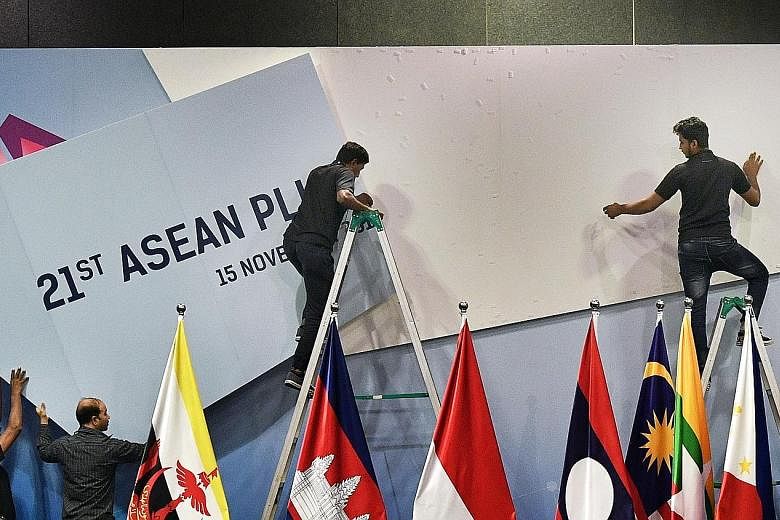Asean has to work with the world as it is and try to maintain cohesion among its member states, said Prime Minister Lee Hsien Loong yesterday.
Noting that "it is a reality there are tensions between the powers", Mr Lee said he hoped that the regional grouping would not be put in a position where it would have to take sides.
He was addressing reporters at the end of the 33rd Asean Summit and related summits and said that Asean, by itself, was not big enough to be a bloc.
It tries to be friends with other nations, he said, and many of them are present at meetings such as the East Asia Summit - which involves 18 countries including China, the United States and Australia - where issues of varying sensitivities are discussed.
"We have to understand where the sensitivities are, where we can cooperate, where different countries would have different positions, and it is not possible for us to go with one or with the other," he said.
While economic cooperation appears to be a positive development, should the global economy pull apart into different blocs, with hindrances to trade and investment, among other matters, Asean would be put in a difficult position, Mr Lee added.
"We will have to deal with this case by case," he said.
Later, he added: "It is very desirable for us not to have to take sides, but the circumstances may come where Asean may have to choose one or the other. I hope it does not happen soon."
Yesterday, Mr Lee was also asked about issues in three areas - the Korean peninsula, South China Sea and Myanmar's Rakhine state - as well as the progress made in reconciling the differing views of various parties.
He said everyone in the Asean Summit meetings was "on the same side" on the Korean peninsula in hoping for regional stability, a reduction of tensions, as well as denuclearisation.
There are, however, differences when it comes to the South China Sea, although he noted that various countries' views are well-known - along with what is being done.
He was referring to a code of conduct (COC) being discussed, to manage differences in South China Sea territorial disputes.
Brunei, China, Malaysia, the Philippines and Vietnam all stake overlapping territorial claims on the disputed waterway.
Mr Lee said it is likely the negotiating text will undergo a first reading next year, as the Chinese have suggested, although it remains unclear if the code will be settled within the next three years.
"It depends what issues come up... I'm sure all the participants will exercise their best efforts in order to try and bring it to a conclusion," he said. "But I do not underestimate the complexity and the difficulty of the problems when you come to the substance of the COC."
On Rakhine state, Mr Lee noted that there have been some developments in the last few weeks, referring to efforts to repatriate the first groups of refugees primed to return to Myanmar.
"We hope it (can) be brought about, but it is just the start of the process, and I think Myanmar understands the anxieties which other countries feel about this matter," he said.
He added: "I believe the State Counsellor (Ms Aung San Suu Kyi) made an effective pitch expressing the complexity of the situation, and how Myanmar is trying its best in order to make some progress."
Asked how the further opening of China will affect Asean member states, Mr Lee expressed hope that Singapore can continue participating in Chinese development, adding that the superpower's growth is also a positive move on the global stage.
But he said given China's current influence, arrangements made previously are harder to wear politically and need to be updated.
Multilateral institutions also need to be updated to reflect the shifting balance in the world economy, and new forms in which economic exchange is taking place, he said.
While he believes China's preoccupation, when it comes to its own development, is domestic, he added that its huge population means its moves have a considerable impact on the rest of the world.
"Increasingly, it will become necessary for China to take into account its impact on the rest of the world... in formulating its policies and in pacing out and structuring its reforms," he said.
Asked about his assessment of US commitment to the Indo-Pacific region, Mr Lee said he believes it is "fully engaged". This comes as some observers cast doubt on US Vice-President Mike Pence's comments about enduring commitment, given that President Donald Trump did not show up in Singapore.
"They want to have influence, they are not at all withdrawing and I believe that," said Mr Lee. "They want to engage but they want to engage in a different way, much more emphasis on what they call fair and reciprocal relationships, which is different from the previous approach."
Mr Lee noted that at one summit, then President Barack Obama was not able to attend and sent Secretary of State John Kerry instead.
"What is important is the substance... the overall relationship and the policies which are pursued, and their cumulative effects over time," he said.


